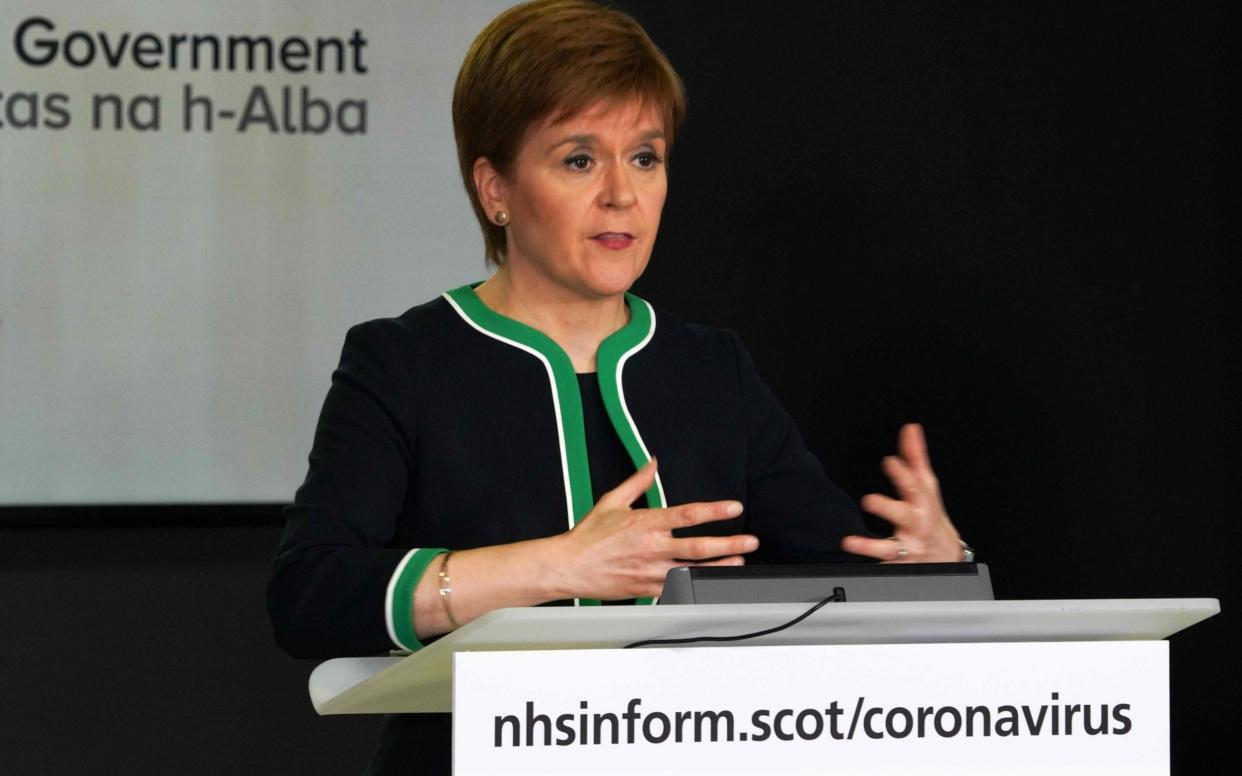BBC faces major backlash after curtailing coverage of Sturgeon press conferences

The BBC is facing a major backlash from Scottish nationalists after it said it would no longer routinely broadcast Nicola Sturgeon’s daily press conferences on TV.
The First Minister suggested the decision, which came after opposition politicians compared her performances to party political broadcasts, could place older people at risk and some of her supporters demanded boycotts of the corporation.
Since the start of the pandemic, the briefings have attracted average audiences of 208,000 on BBC 1. A longer version, on the BBC Scotland channel, has been watched by 40,000 people on average, figures released by the corporation to The Daily Telegraph show.
The BBC has said that from Monday, it will take a decision on whether to screen the briefings on "editorial merit", meaning they would only be shown if Ms Sturgeon is making a significant announcement. It will continue to be shown on the BBC website, as well as by the Scottish Government’s online channels.
Our response to queries about the change in how we will cover the daily Scottish Government briefings from next week. pic.twitter.com/2OzuxZCIxR
— BBC Scotland News PR (@bbcscotnewspr) September 11, 2020
However, Ms Sturgeon said her ability to communicate directly with the public was “more important than ever,” as the country approaches winter and with cases on the rise.
“What is broadcast on the BBC is a matter for the BBC but we are in unique circumstances right now and the ability for me and my colleagues to communicate directly with the public has never been more important than it is right now,” she said.
She said older people who do not have access to the internet and people with disabilities have found the briefings "particularly important".
I am utterly stunned that the BBC would remove televised public health briefings at a point in the pandemic where we go into winter with increased risks. I will be writing to Email: director.general@bbc.co.uk in the morning. If you rely on them for info I suggest you do too.
— Gillian Martin (@GillianMSP) September 10, 2020
The First Minister added: "All I would ask is that they [the BBC] take all of that into account in the decisions that they make."
By Friday evening, around 25,000 people had signed an online petition calling for a U-turn. Some of Ms Sturgeon’s MSPs urged people to complain directly to the corporation. John Swinney, the deputy First Minister, described the decision as “a matter of regret”.
However, it was welcomed by some of the SNP’s opponents, who have said the First Minister regularly uses the platform to deliver party-political messages to voters. Some believe the briefings are a major factor in her high approval ratings, ahead of next May’s Holyrood election.
BBC Scotland's decision to stop broadcasting daily briefings has severe consequences for our Deaf community. An important thread and statement from @grantyferguson (Scotand's first elected Deaf BSL user): https://t.co/1g3mnip97U
— Jamie Szymkowiak (@jamieszymko) September 11, 2020
Ms Sturgeon said: "I have always taken great care to try not to stray into political territory, I'm not saying I've never slipped up - I am fallible.
"But I've always recognised my responsibility to keep these briefings very much on topic because I want people regardless of their politics to be able to listen and hear the messages that are so important."
A leaked BBC briefing note states that the decision was taken to ensure a “consistent approach to coverage... across the UK nations” and because parliament, schools and other parts of daily life had largely returned to “normal business”.
Labour peer George Foulkes, who had complained to BBC Scotland about the briefings, welcomed the move, saying important information on the pandemic would still be shown, but without “party propaganda”.
Tory MSP Graham Simpson called the decision "excellent news" while his colleague Murdo Fraser said it was “not before time”.

